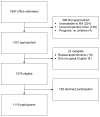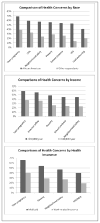What are parents worried about? Health problems and health concerns for children
- PMID: 22843294
- PMCID: PMC3608110
- DOI: 10.1177/0009922812455093
What are parents worried about? Health problems and health concerns for children
Abstract
Patient-centered care requires pediatricians to address parents' health concerns, but their willingness to solicit parental concerns may be limited by uncertainty about which topics will be raised. The authors conducted surveys of parents to identify current health-related issues of concern.
Methods: Participants rated 30 items as health problems for children in their community (large, medium, small, or no problem) and volunteered concerns for their own children.
Results: A total of 1119 parents completed the survey. Allergies (69%), lack of exercise (68%), asthma (65%), attention deficit hyperactivity disorder (65%), Internet safety (63%), obesity (59%), smoking (58%), and bullying (57%) were identified as important problems (large or medium) with variation among demographic subgroups. Concerns for their own children included healthy nutrition; obesity; lack of exercise, healthy growth and development; safety and injury prevention; and mental health issues.
Conclusion: Parents' health concerns for children are varied and may differ from those routinely addressed during well-child care.
Conflict of interest statement
Figures
References
-
- Moseley KL, Freed GL, Goold SD. Which sources of child health advice do parents follow? Clin Pediatr (Phila) 2011 Jan;50(1):50–56. - PubMed
-
- Young KT, Davis K, Schoen C, Parker S. Listening to parents. A national survey of parents with young children. Arch Pediatr Adolesc Med. 1998 Mar;152(3):255–262. - PubMed
-
- Bright Futures: Guidelines for Health Supervision for Infants, Children, and Adolescents. 3. Elk Grove Village, IL: American Academy of Pediatrics; 2008.
-
- Belamarich PF, Gandica R, Stein RE, Racine AD. Drowning in a sea of advice: pediatricians and American Academy of Pediatrics policy statements. Pediatrics. 2006 Oct;118(4):e964–978. - PubMed
-
- Tanner JL, Stein MT, Olson LM, Frintner MP, Radecki L. Reflections on well-child care practice: a national study of pediatric clinicians. Pediatrics. 2009 Sep;124(3):849–857. - PubMed
Publication types
MeSH terms
Grants and funding
LinkOut - more resources
Full Text Sources
Medical




